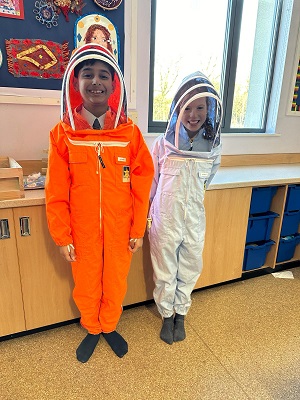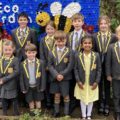Beekeeping: A hive of activity at Greenbank Preparatory School
Greenbank Preparatory School and Day Nursery are a buzz with excitement as it launches their new initiative — beekeeping!
Under the guidance of dedicated beekeepers Mrs Aizlewood and Mrs Staples, the school is taking a proactive step towards promoting sustainability, environmental awareness, and hands-on education. With their guidance, students learn the intricacies of beekeeping while developing a deeper appreciation for the role bees play in our ecosystem. Lyndsey Aizelwood explains.
Importance of Beekeeping
The introduction of beekeeping at Greenbank holds immense significance in today’s world. Bees are vital pollinators, responsible for a substantial portion of the world’s food supply. By nurturing bee colonies, the school is not only safeguarding these essential insects but also contributing to the preservation of biodiversity and ecological balance.
Alignment with the Green Flag Eco School Program
 This initiative integrates with Greenbank’s participation in the Green Flag Eco School program. By incorporating beekeeping into the curriculum, we continue our commitment to sustainability, environmental education, and community engagement. Through practical experiences like tending to beehives and observing bee behaviour, students gain valuable insights into nature and the impact of human actions on the environment.
This initiative integrates with Greenbank’s participation in the Green Flag Eco School program. By incorporating beekeeping into the curriculum, we continue our commitment to sustainability, environmental education, and community engagement. Through practical experiences like tending to beehives and observing bee behaviour, students gain valuable insights into nature and the impact of human actions on the environment.
Involvement of Year 5 and 6 Students
Students in Years 5 and 6 are fully involved in the project. Through hands-on activities and educational workshops, they gain practical experience in beekeeping, from building and tending to the hives to extracting honey. This engagement fosters a deeper understanding of the importance of bees in our ecosystem and the significance of sustainable practices in preserving their habitat.
Greenbank Preparatory School and Day Nursery’s beekeeping project is not merely a hive of activity—it’s a testament to the school’s commitment to sustainability, environmental education, and community involvement. By nurturing bee colonies and fostering a deeper connection to nature, we are sowing the seeds for a greener, more sustainable future.
• A single honeybee can visit up to 5,000 flowers in a day.
• Bees communicate through a fascinating dance known as the “waggle dance” to convey the location of food sources.
• Honeybees are the only insects that produce food consumed by humans, namely honey.








What a good idea. Just hope that the hornets that have arrived in the uk don’t kill them
what a great way to learn all about bees and honey!!
That is amazing! I have a fear of bees and wasps that I don’t seem to have passed on to my kids thankfully.